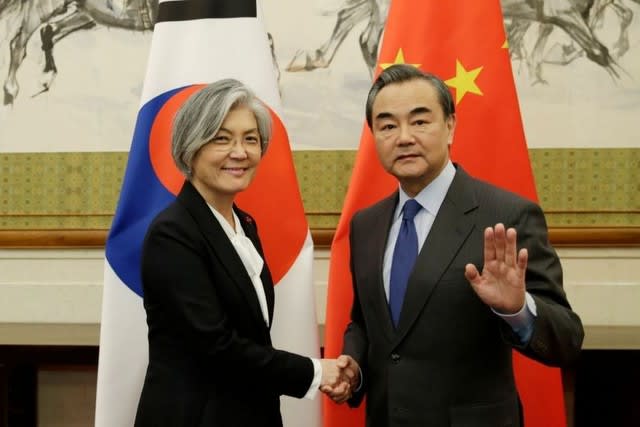トランプの顔に泥を塗った文在寅 米韓同盟はいつまで持つのか
韓国・北朝鮮2019年8月27
共通の敵がなくなったので同盟解消というのは、論理的には、そのとおりで、We need a common enemy to unite us. Japan and Korea have none.で似たようなことを書いた。
しかし、英語圏の記事についていえば、 私は、韓米同盟破棄に都合のいい部分を引用しているが、韓米同盟破棄という気配は全然ない。関係者は、韓国が同盟国の一員であることを前提に叱咤激励している感じだろうね。
非核化と米韓同盟破棄セット説は昔からあるし、私は支持しているんだが、たぶん少数派だろね。元海将の香田さんのいうほうが説得力はある。
たた、文在寅は期待できる。まさか、しないだろう、ということをやってくれている。
トランプも予想できない。米軍駐留費をめちゃくちゃふっかけて、文在寅がどうでるか?
韓国は日本が南北統一を邪魔している、と妄想しているようだが、日本としては、南北統一を応援するような声をあげていくべきだろうね。
南北統一するには、米韓同盟破棄せざるえないからね。
韓国・北朝鮮2019年8月27
2017年の大統領選挙でも、文在寅候補はGSOMIAの再検討を公約していた。ただ、米国との関係悪化を恐れ、直ちには動けなかった。それが今回、「信用できない日本」を口実に破棄できるようになったので実行した、ということに過ぎません。
理由は簡単です。米韓の「共通の敵」が消滅し始めたからです。
北朝鮮の核問題が浮上したことが米韓同盟の消滅を大きく後押ししました。2017年1月に登場したトランプ(Donald Trump)政権が「北朝鮮の非核化」の見返りとして「米韓同盟の廃棄」に応じる方針に舵を切ったからです。
――では、米韓の正式な離婚は当分ない?
鈴置: そう思います。ただ、決めつけは危険です。朝鮮半島では何が起こるか分からないのです。着目すべきは「中途半端な北朝鮮の非核化が始まる時」です。
不完全であっても「非核化」は米韓同盟の廃棄とセットになる可能性が高い。すると韓国は「離米従北」に舵を切るしかなくなる。
共通の敵がなくなったので同盟解消というのは、論理的には、そのとおりで、We need a common enemy to unite us. Japan and Korea have none.で似たようなことを書いた。
しかし、英語圏の記事についていえば、 私は、韓米同盟破棄に都合のいい部分を引用しているが、韓米同盟破棄という気配は全然ない。関係者は、韓国が同盟国の一員であることを前提に叱咤激励している感じだろうね。
非核化と米韓同盟破棄セット説は昔からあるし、私は支持しているんだが、たぶん少数派だろね。元海将の香田さんのいうほうが説得力はある。
たた、文在寅は期待できる。まさか、しないだろう、ということをやってくれている。
トランプも予想できない。米軍駐留費をめちゃくちゃふっかけて、文在寅がどうでるか?
韓国は日本が南北統一を邪魔している、と妄想しているようだが、日本としては、南北統一を応援するような声をあげていくべきだろうね。
南北統一するには、米韓同盟破棄せざるえないからね。












